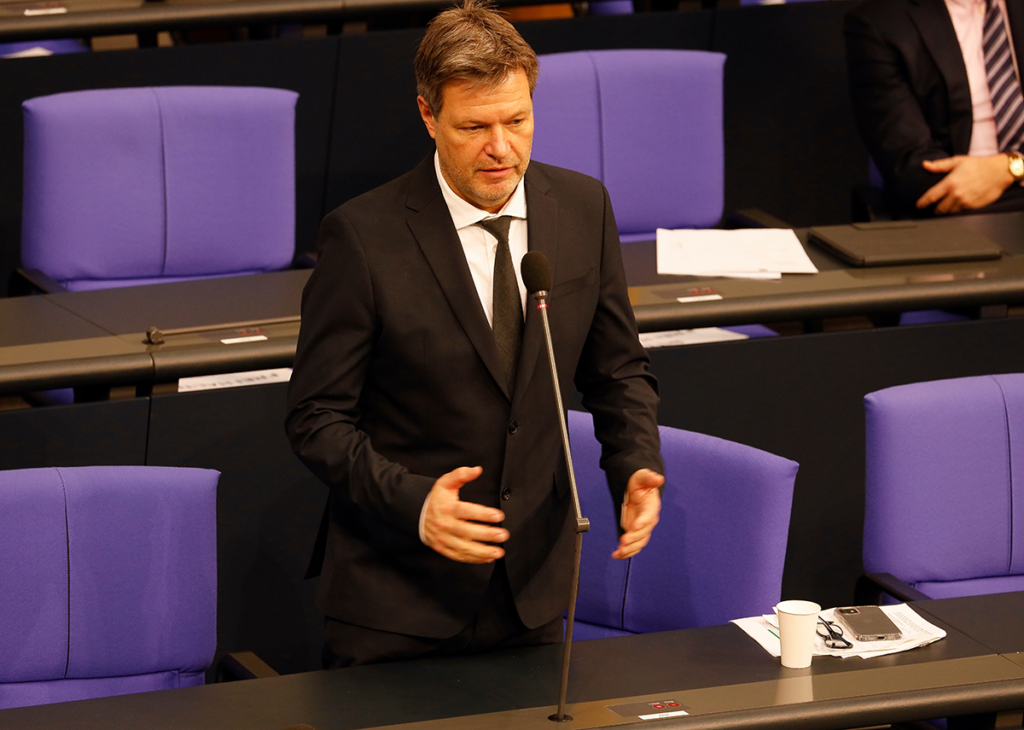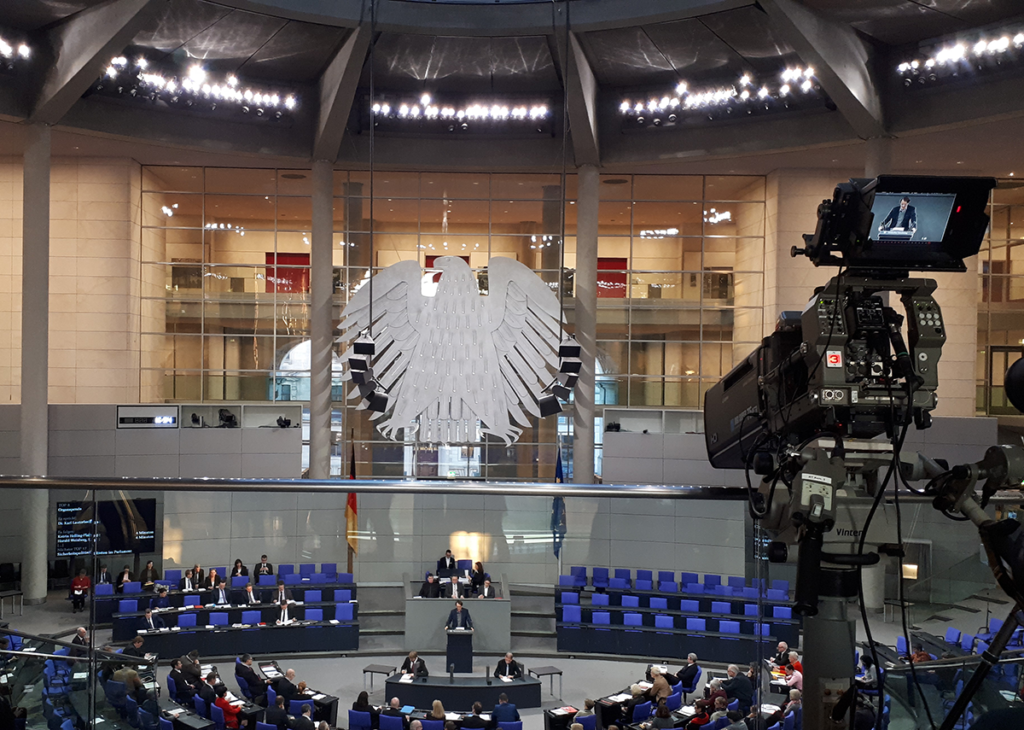Solutions to the Building Energy Act: How it can be achieved – with energy-efficient new buildings and/or energy-efficient renovations
Language selection 📢
Published on: September 11, 2023 / update from: September 11, 2023 - Author: Konrad Wolfenstein

Solutions for the Building Energy Act: For energy-efficient new buildings and energy-efficient renovations – Image: Xpert.Digital
Habeck's heating law: The future of energy efficiency
Experts in the field of environmental protection and sustainable energy have thought intensively about how Habeck's heating law can be made even more effective for the climate. In this section we will introduce you to concrete measures that have the potential to optimize this law and make a significant contribution to reducing CO2 emissions.
The meaning of Habeck's heating law
First of all, it is important to understand why Habeck's heating law is so crucial for climate protection. It sets clear goals for reducing energy consumption in buildings and promotes the use of renewable energy. These are steps in the right direction, but we believe more can be done.
Effective measures for optimization
Here are some effective measures that can be taken to make Habeck's heating law even more efficient:
Promoting building renovation
We propose to promote the renovation of buildings to reduce energy consumption.
Innovative heating technologies
The development and implementation of innovative heating technologies can help further reduce energy consumption.
Better insulation
Improved building insulation is a key element in minimizing heat loss.
Renewable energy incentives
Creating incentives for the use of renewable energy in buildings is crucial.
Citizen participation
Involving citizens in the process and raising awareness of energy-efficient heating are of great importance.
📣 Similar topics
- Sustainable heating: How we can make Habeck's law even better
- Climate saviors wanted: Let's optimize Habeck's heating law
- Energy efficiency in focus: Habeck's heating law rethought
- Together for the climate: Measures to improve Habeck's heating law
Promoting building renovation, innovative heating technologies and incentives for renewable energy are just some of the measures that can be taken. 🌍💚
📣 Energy-related renovation and new construction, consulting, planning and implementation for industry, retail and municipalities
Our experienced team will support you in optimizing your buildings to reduce energy consumption and promote sustainable energy use with photovoltaics. We analyze your individual needs and create tailor-made concepts that make sense both economically and ecologically. Regardless of whether it is about the energy-efficient renovation of existing buildings or the construction of new energy-efficient structures, we are at your side. Industrial facilities, retail buildings and municipal facilities can reduce their energy costs and reduce environmental impact while improving the comfort and efficiency of their buildings through our tailored solutions.
👨🏻 👩🏻 👴🏻 👵🏻 Energy-saving renovation and new construction, advice, planning and implementation for private households
We offer comprehensive support for private households in the energy-efficient renovation and construction of new buildings with photovoltaics. Our experienced team is at your side to help you advise, plan and implement your sustainable energy solutions. We analyze your energy consumption, identify savings potential and develop tailor-made concepts to improve your energy efficiency. From improving building insulation to installing energy-efficient windows and doors to installing photovoltaic and solar systems - we accompany you step by step to make your home more energy efficient and environmentally friendly. Trust in our expertise and benefit from the numerous advantages that energy renovation and the use of renewable energies offer you. Together we will create a sustainable future for your home.

Xpert.Plus warehouse optimization - high-bay warehouses such as pallet warehouses consulting and planning
The future of the heating law: expert advice for effective climate protection
After months of discussions and negotiations, the Heating Act, also known as the Building Energy Act (GEG), was finally passed. But the latest calculations show that in its current form it is less effective than originally planned. The question that now arises is how the traffic light coalition can still achieve the climate goals in the building sector. In this section we will take a closer look at the opinions of experts on this topic.
The heating law, which targets renewable heating systems, is expected to save 39.2 million tons of CO2 emissions by 2030, as estimated by the Federal Ministry for Economic Affairs and Climate. These estimates are based on calculations by the Öko-Institut. However, despite these efforts, there are doubts as to whether this reduction is enough to achieve the ambitious 2030 climate targets in the building sector.
The law, which will require heating with 65 percent renewable energy in most new buildings from January 1, 2024, is a step towards climate protection. It aims to promote climate-friendly heating and reduce CO2 emissions in the building sector. In addition, landlords can pass on the CO2 costs to tenants, which creates incentives for more efficient heating systems. The CO2 price per ton will be gradually increased until 2025, which could further spur the shift to environmentally friendly heating technologies.
The question of whether these measures are sufficient to achieve climate goals is complex and depends on various factors, including the actual implementation of the law and further policy measures in the buildings sector. It remains to be seen how effective these steps in reducing CO2 emissions will actually be.
Why did Economics and Climate Protection Minister Robert Habeck defend the heating law against sharp criticism from the opposition and emphasize the need for concrete measures for climate-neutral goals?
The current Building Energy Act is viewed by some experts as inadequate and a victory for the gas lobby. There are calls for the installation of new oil and gas heating systems to be banned as quickly as possible and for the switch to emission-free energy systems to be made easier. Experts are also calling for a significant increase in the CO2 price in order to achieve sufficient steering effect.
This question is about the public perception of the current Building Energy Act and the demands for a switch to emission-free energy systems and an increase in the CO2 price. Let's take a closer look at the individual aspects:
🏢 The perception of the current building energy law
The Building Energy Act is a central issue in German energy policy. It regulates the requirements for the energy efficiency of buildings. The law is controversially discussed in public. Some see it as insufficient to drive the much-needed energy transition. This view is often associated with the influence of the gas lobby.
🚫 Call for a ban on oil and gas heating
An important demand made in this context is the ban on new oil and gas heating systems. This step is supported by environmentalists and experts because oil and gas heating contribute significantly to CO2 emissions. The aim is to accelerate the transition to environmentally friendly heating systems.
🌿 Switching to emission-free energy systems
Promoting the switch to emission-free energy systems is a central point in the discussion. This includes the increased use of renewable energies such as solar energy and wind power as well as the use of heat pumps and hydrogen technologies. These measures are intended to help reduce greenhouse gas emissions.
💰 Significant increase in the CO2 price
Another demand from experts is a significant increase in the CO2 price. This price is intended to create an incentive for companies and consumers to reduce their CO2 emissions. Higher taxation of CO2 emissions can help advance climate protection.
Additional insights
1. Gas lobby and building energy law
There are reports of how the gas lobby influenced the design of the Building Energy Act. This has led to debate about the effectiveness of the law.
2. Ban on oil and gas heating
Experts and environmentalists argue that a ban on new oil and gas heating is necessary to achieve climate goals. This could also have economic implications and requires careful planning.
3. Transition to zero-emission energy systems
The transition to zero-emission energy systems is a complex process that requires investment and technological innovation. There are already projects and initiatives supporting this transition.
4. Increase in the price of CO2
The discussion about increasing the CO2 price is an important part of climate policy. Such a measure could help reduce emissions but also have a social impact.
5. Public opinion and political decisions
Public opinion plays a crucial role in political decisions on the energy transition. Citizens and NGOs are actively involved in this area.
📣 Similar topics
- The controversy over the Building Energy Act: A victory for the gas lobby?
- Climate protection in Germany: The fight against oil and gas heating.
- On the way to the energy transition: the switch to emission-free energy systems.
- Carbon price increases: A key to controlling emissions.
- Building Energy Act: Between environmental protection and economic interests.
- The role of public opinion in energy policy.
- Energy transition in Germany: challenges and opportunities.
- Gas lobby and climate policy: influence and countermeasures.
- Innovation approaches for environmentally friendly heating systems.
- CO2 pricing debate: Impact on companies and consumers.
#️⃣ Hashtags: #Energy transition #Climate protection #Building energy law #CO2 price #Gas lobby
Plan your solar system for the most common applications conveniently online with our solar system planner!
With our user-friendly solar system planner you can plan your individual solar system online. Whether you need a solar system for your home, your business or for agricultural purposes, our planner offers you the opportunity to take your specific requirements into account and develop a tailor-made solution.
The planning process is simple and intuitive. You simply enter relevant information. Our planner takes this information into account and creates a tailor-made solar system that meets your needs. You can try out different options and configurations to find the optimal solar system for your application.
Additionally, you can save your plan to review later or share with others. Our customer service team is also available to answer your questions and provide support to ensure your solar system is optimally planned.
Use our solar system planner to plan your individual solar system for the most common applications and advance the transition to clean energy. Start now and take an important step towards sustainability and energy independence!

The solar system planner for the most common applications: Plan the solar system online here - Image: Xpert.Digital
More about it here:
🗒️ Climate targets in the building sector and the heating law by 2030
Heating is an important aspect of our daily quality of life, but it also has a significant impact on the environment. The Federal Ministry for Economic Affairs and Climate estimates that the current heating law can save around 39.2 million tons of CO2 by 2030. These estimates are based on data from the Öko-Institut. However, there are concerns as to whether these measures will be enough to achieve the climate targets in the building sector by 2030.
1. 🏢 Importance of the building sector
The building sector is one of the main causes of CO2 emissions in Germany. It is therefore crucial that it makes a significant contribution to achieving climate goals.
2. 📉 CO2 savings through the heating law
The current heating law aims to reduce CO2 emissions through more efficient heating systems and the use of renewable energies. But while a saving of 39.2 million tons of CO2 is significant, it may not be enough to meet the country's overall climate goals.
3. 🔬 Basics of estimates
The Öko-Institut, which made these estimates, bases its calculations on a variety of factors, including expected technological advances, the rate of renewal of heating systems and the introduction of new technologies.
4. ❓Doubts and concerns
Despite the positive forecasts, there are concerns as to whether the goals can be achieved. Some experts argue that even more aggressive measures are needed to achieve the desired reductions.
🌍 Worldwide context
Germany is not the only country facing the challenge of achieving its climate goals in the building sector. Many countries have set aggressive goals to limit global temperature rises and are looking for ways to achieve these goals.
📚 Further measures
It may be necessary to go beyond the heating law and take further measures to achieve climate goals. This could include increased use of renewable energy, the introduction of stricter building regulations or incentives for homeowners to modernize their homes.
🔍 Looking into the future
It remains to be seen whether the current measures will be sufficient. But it is clear that the path to achieving climate targets in the buildings sector will present both challenges and opportunities.
📣 Similar topics
- 🌍 Climate targets in the building sector: A global challenge
- 📊 The Heating Act 2030: Is it enough?
- 🔬 How the Öko-Institut calculates CO2 savings
- 🌡️ The role of heating in climate change
- 🤔 Why there are concerns about current estimates
- 🍃 Renewable energies as a solution for the building sector
- 🚀 Technological progress and climate goals
- 🏘️ The potential of building renovations in climate protection
- 💡 Ways to achieve climate goals in the building sector
- 🔎 The future of heating and its role in climate protection
#️⃣ Hashtags: #ClimateGoals2030 #HeatingLaw #ÖkoInstitutBerechnungen #BuildingSectorChallenge #ZukunftDesHeizens
🗒️ The Building Energy Act (GEG) and its effects on the switch to climate-neutral energies
The Building Energy Act (GEG) is a central component of the energy transition in Germany. It combines the requirements for the energetic quality of buildings and the use of renewable energies. With regard to the question, the GEG actually points out that new gas and oil heating systems are permitted up to municipal heat planning. This can lead to a delayed transition to climate-neutral energy. Nevertheless, experts emphasize the importance of a high CO2 price to deter new fossil investments and accelerate the switch to green hydrogen.
1. The challenges of the heat transition
- 🔍 The GEG allows the installation of new gas and oil heating systems up to a certain point, which could slow down the conversion process.
- 🍀 The need to accelerate the transition to climate-neutral energy is clear. It's not just about protecting the environment, but also about reducing dependence on fossil fuels.
2. The role of the carbon price
- 🌍 A high carbon price can make companies and households more inclined to invest in environmentally friendly technologies.
- 💡 It sends a strong signal to the market: investments in fossil fuels are not future-proof and can be financially risky.
3. Green Hydrogen: The Future of Energy?
- 🌱 Green hydrogen can serve as a clean energy source and pave the way for a sustainable future.
- ⚡ Transitioning to green hydrogen could meet the country's energy needs in the coming years while reducing its carbon footprint.
4. Socially acceptable heating transition
- – ❤️ It is important that all citizens – regardless of their income – can benefit from the energy transition.
- 🤝 Low-income households should be financially supported to make the switch to sustainable energy easier and to make the heating transition socially acceptable.
📣 Similar topics
- 🌍 The GEG: A step towards climate neutrality
- 💡 CO2 prices: The signal for green investments
- 🌱 Green hydrogen: The key to the energy transition?
- ❤️ A heat transition for everyone: social responsibility
- 🔍 Challenges and opportunities of the heat transition
- ⚡ The future of energy: Green hydrogen in focus
- 🍀 The environmentally friendly way forward: The GEG explains
- 🤝 Support for low-income households in the energy transition
- 🌎 From fossil fuels to green hydrogen: The journey
- 💚 Germany on the way to a green future
#️⃣ Hashtags: #Building Energy Act #Green Hydrogen #Heat Transition #CO2 Price #Social Compatibility
🗒️ The Building Energy Act (GEG) and the uncertainties regarding hydrogen and biogas
The Building Energy Act (GEG) in its current form actually has some criticisms and uncertainties, particularly with regard to hydrogen and biogas. The challenge is that neither hydrogen nor biogas are currently able to cover heating requirements to a significant extent.
📌 Hydrogen and biogas in current energy policy
Hydrogen and biogas are promising alternatives to fossil fuels. They are considered cleaner energy sources that have the potential to significantly reduce carbon footprints. However, the technologies and infrastructure needed to exploit them on a large scale are not yet fully developed.
📌 The heat transition in other countries
There are countries that have already successfully implemented a heating transition. These countries rely on a combination of policy instruments. These include measures such as CO2 pricing, strict regulations and financial incentives.
🚀 CO2 pricing
CO2 pricing is an important tool for reducing greenhouse gas emissions. It provides incentives for companies and consumers to switch to more environmentally friendly technologies and practices.
🛑 Regulation
Strict regulations can help accelerate the transition to renewable energy. They can set standards for energy efficiency and limit the use of fossil fuels.
💰 Financial support
Government subsidies and financial incentives can promote the use of renewable energy. They can help reduce the cost of renewable technologies and encourage investment in this sector.
📡 Communication strategy and long-term policy
To gain public trust and provide clarity about energy policy, a clear communication strategy is crucial. In addition, political decisions must be long-term and consistent.
📣 Similar topics
- 🍃 The potential of hydrogen and biogas
- 🌍 The heat transition: success stories from other countries
- 💨 CO2 pricing: A step in the right direction
- 🔗 Regulations: Strict standards for a green future
- 💸 Financial incentives for renewable energy
- 📢 Clear communication for a greener tomorrow
- 🛤️ The need for long-term energy policy
- 🔍 The GEG in focus: opportunities and challenges
- 🔄 The role of biofuels in the energy transition
- 💡 Future prospects: How we can master the heat transition
#️⃣ Hashtags: #Warm Transition #Energy Policy #CO2 Pricing #RenewableEnergy #GEGZukunft
The GEG certainly has room for improvement, particularly with regard to renewable energy sources such as hydrogen and biogas. It is important that policy follows successful examples from other countries and uses a combination of tools to accelerate the transition to clean energy.
🗒️ There is no question that the heating law in its current form is not sufficient to achieve the ambitious climate goals in the building sector
The introduction of the heating law was a step in the right direction to reduce CO2 emissions in the building sector. But as the question already emphasizes, the current form of the law has weaknesses and is not sufficient to achieve the ambitious climate goals in the building sector.
1. 🔥 Clear strategy required
Experts agree that a clear strategy is needed to minimize CO2 emissions in the building sector. Such a strategy could, for example, be based on a combination of stricter building regulations, the promotion of renewable energy and the reduction of energy consumption.
2. 💸 Higher CO2 pricing
Higher carbon pricing could create incentives for investment in climate-friendly technologies while making the use of fossil fuels less attractive.
3. 🔄 Faster switch to climate-friendly heating systems
There are many climate-friendly alternatives to conventional heating systems. But the transition must be made faster and more efficient in order to achieve the ambitious climate goals.
📣 Similar topics
- 🌍 Climate goals in the building sector: Why the heating law is not enough.
- 🔥 Heating in transition: The vision of a CO2-neutral future.
- 💡 The role of experts in the fight against climate change.
- 🏠 Modern technologies for a green home.
- ⏱️ Time for change: The traffic light coalition and its challenge.
- 🔄 Switch: The advantages of renewable energies in the heating sector.
- 💸 CO2 pricing: Why more expensive is better.
- 👨🔬 Expert voices: What they say about the heating law.
- 🌿 Green Vision: The path to a climate-friendly building sector.
- 🚀 Innovative thinking: How engineers are changing the heating landscape.
#️⃣ Hashtags: #Climate Goals2023 #GreenHeating #CO2Pricing #RenewableEnergy #Traffic Light CoalitionChallenge
The traffic light coalition has the difficult task of revising the heating law and taking the necessary measures. But with a clear vision and the right support, this can be achieved.
We are there for you - advice - planning - implementation - project management
☑️ Expert advice on energy-efficient renovation and new construction
☑️ with solar solutions and heat pumps/air conditioning systems
I would be happy to serve as your personal advisor.
You can contact me by filling out the contact form below or simply call me on +49 157 30 44 9 555 .
I'm looking forward to our joint project.
Xpert.Digital - Konrad Wolfenstein
Xpert.Digital is a hub for industry with a focus on digitalization, mechanical engineering, logistics/intralogistics and photovoltaics.
With our 360° business development solution, we support well-known companies from new business to after sales.
Market intelligence, smarketing, marketing automation, content development, PR, mail campaigns, personalized social media and lead nurturing are part of our digital tools.
You can find out more at: www.xpert.digital - www.xpert.solar - www.xpert.plus
Current news on the Heating Act: Bundestag decision on the controversial Building Energy Act (GEG)
More about it here:
The next hammer is looming: EU obligation to renovate – the Building Energy Act (GEG) is just the calm before the storm
More about it here:


































